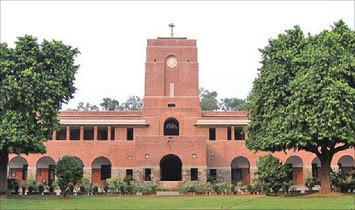Delhi University’s CSAS 2025 UG admission form has drawn criticism for listing “Muslim” as a mother tongue while omitting Urdu, a constitutionally recognized language. Academics condemned the move as communal, culturally reductive, and violative of constitutional linguistic rights.
Delhi University’s Common Seat Allocation System (CSAS) 2025 form for undergraduate admissions has sparked widespread criticism after it listed “Muslim” as a mother tongue. Meanwhile, Urdu, a constitutionally recognised language under the Eighth Schedule, is absent. Screenshots showed that DU’s online application form included terms like “Muslim”, “Bihari”, “Mochi”, “Kurmi”, and other caste/regional labels in the “Mother Tongue” dropdown while omitting Urdu. This negligent act has sparked outrage, as students and professors took to social media platforms to point out the underlying communal rhetoric.
This is not just a clerical error. It reflects a deep-rooted communal mindset that reduces an entire community to a religious label, stripping away linguistic, cultural and regional identities. Muslim is not a language. Muslims speak the same languages as others in their regions, be it Hindi, Punjabi, Bengali, Malayalam, Tamil, or Urdu.”
Said Professor Abha Dev Habib, Democratic Teachers’ Front general secretary
The academicians and students argued that the choice of replacing Urdu with Muslim, apart from being factually incorrect, also implies that Muslims are incapable of having any other mother tongue than Urdu. This not only erases the linguistic diversity of Indian Muslims but also reduces an entire community’s cultural identity to a single, inaccurate label.
….this act of the DU administration is a serious threat to the Constitution of India, as it violates the Eighth Schedule of the Indian Constitution, and also it undermines the composite and the inclusive spirit of a central university! No administration of DU had been so overtly communal as the present one, and this recent assault on Urdu takes the cake!”
Stated Prof. Rudrashish Chakraborty, Associate Professor and DUTA Executive
He further stated that such a development is “a calculated act of communalism”. He added that DU seems to have mistakenly assumed that Urdu is exclusive to Muslims; it does not mean only erasing a language, but it also entails erasing a shared cultural and literary legacy.
It is sad that a premier university like Delhi University is committing such mistakes. These should be rectified immediately. Diversities and multilingualism need to be acknowledged and respected,” said Dr Mithuraaj Dhusiya, Executive Council member.
This exclusive stance from prominent central universities also raises questions about the larger ethos shaping the actions of the current administration as members of academia worry about its “rabidly communal” policies.
Image Credits: Devesh, DU Beat
DU Beat




